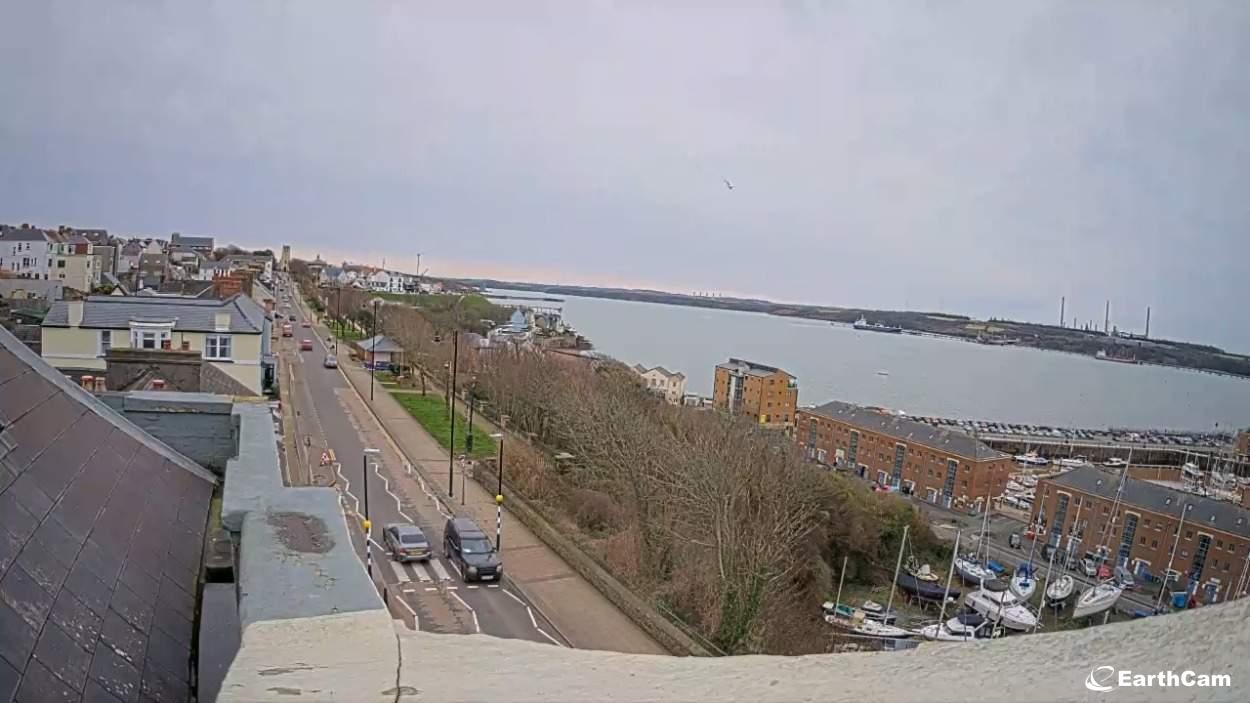Community
Pembroke Dock care home with no planning permission for 15 years can stay open

A PEMBROKE DOCK care home which has been operating without planning permission for some 15 years has been approved by county planners.
Care home specialist Orbis Ltd sought a retrospective change of use for the former house on Stockwell Road to a residential care home for up to five adults, plus staff; the change of use having started in September 2009.
A supporting statement accompanying the application, by agent C2J Architects & Town Planners, said: “The applicant, Orbis Ltd is a sector-leading provider of specialist services for children and adults with complex needs associated with autism.
“Their integrated model of learning and living, combined with a holistic therapeutic approach, ensures that they can offer unique homes for life with continuous community-based learning for adults.
“The applicant’s primary aim is to provide a safe environment that encourages individuality, self-confidence, self-esteem and lifelong learning. It is a person-centred approach, encouraging adults to learn and develop skills that will enable them to play an active role in their community, supporting them to make their own informed decisions. The applicants work closely with families and carers to support individuals to develop and maintain relationships.”
It went on to say: “Up to five adults would remain at the property as their principal residence. Adults who are in the guardianship of Orbis have been taken into care for a variety of reasons, including fears for their physical wellbeing, learning disabilities or because of emotional or behavioural difficulties.
“The existing dwelling has been in use as a care home and registered with Care Inspectorate Wales for over 15 years, despite not formally having planning permission. It is key to note that given the use (C2) has been in operation for a continuous period in excess of 10 years, in accordance with Section 171B (3) of the Planning and Compensation Act 1991, the current use is immune from any enforcement action.”
A report by planning officers, recommending approval, noted the retrospective nature, but added: “The scale and design of the property would remain acceptable within its setting and the surrounding area. There would be no impact on the residential amenity of the property or neighbouring properties.”
The application was conditionally approved by planning officers.
Community
New corporate member joins Narberth & Whitland Rotary

NARBERTH & Whitland Rotary has welcomed its first Corporate Member.
On Wednesday (Feb 11), Stephen Vale, Insurance Broker Manager with Lloyd & Whyte in St Clears, was formally inducted at the club.
The induction ceremony was carried out by South Wales District Governor Ian Hughes, following an introduction by Narberth & Whitland Rotary President Robin Bradbury.
Corporate Membership recognises the increasing emphasis businesses place on corporate social responsibility, enabling companies to give back to their local communities through Rotary’s established structures and projects.
Rotary says corporate membership also offers opportunities for staff development, leadership experience, and involvement in fundraising and volunteering activities that deliver tangible benefits to the community.
Pictured (left to right): South Wales District Governor Ian Hughes, Corporate Member Stephen Vale, and Narberth & Whitland President Robin Bradbury.
Community
Second Milford Haven webcam launched after 1.3m views and US TV feature

Twin live feeds from Herald roof now showcase both marina and Milford Haven Waterway
A SECOND live webcam overlooking Milford Haven has gone live from the roof of 11 Hamilton Terrace — home of The Pembrokeshire Herald — expanding the town’s growing global digital footprint.
The original harbour-facing camera, streamed worldwide via EarthCam, has already clocked up more than 1,300,000 views. It even featured on ABC News in the United States, where the Milford Haven view was broadcast live ahead of a national weather forecast.
That first stream — listed on EarthCam as “Wales Waterway” — looks across Milford Marina and the busy lower reaches of the Haven, capturing ferry departures, commercial shipping, leisure craft and the changing light across the Pembrokeshire skyline.
Now, a second camera has been added, offering a complementary perspective further up the Milford Haven Waterway towards the Cleddau.
A global window on Wales’ largest port
The new feed captures daily activity along the largest port in Wales — from the twice-daily Wales–Ireland ferry sailings to petroleum, oil and gas tankers moving more than 60 million tonnes of cargo each year. Thousands of smaller vessels, from yachts to powerboats, also pass through the Waterway annually.
Together, the two cameras provide twin live perspectives of one of the UK’s most strategically significant maritime corridors.

As dawn broke over Milford Haven this morning, the Waterway lay still beneath a clear sky, the first light spilling across rooftops and masts before stretching out over the wide expanse of the Haven.
From the vantage point of Hamilton Terrace, the scene felt both intimate and expansive — a quiet town waking gently while a major working port prepared for another day of movement and industry.
It is moments like these that help explain the worldwide appeal of the EarthCam streams. Viewers tuning in from across the UK, Europe and North America are not simply watching ships pass; they are witnessing the rhythm of tide and trade, the sweep of weather systems, and the subtle beauty of West Wales unfolding in real time.
From dramatic winter steam plumes rising from power station chimneys to calm summer sunsets over the marina, Milford Haven’s live feeds have become a constantly changing digital canvas.
Watch live
Original harbour view (1.3 million+ views):
https://www.earthcam.com/world/uk/wales/?cam=waleswaterway
New up-the-Waterway view:
https://www.earthcam.com/world/uk/wales/?cam=waleswaterway2
The Herald hopes the second camera will prove just as popular — continuing to put Milford Haven on the global map, one sunrise at a time.

Community
Young people shine at Pembrokeshire Spotlight Awards

YOUNG people from across the county were recognised for their courage, talent and community spirit at this year’s Pembrokeshire Spotlight Awards.
The fourth annual celebration, organised by Pembrokeshire Youth, the Children and Young People’s Rights Office and Pembrokeshire County Council Children’s Services, honours children and young people who achieve exceptional things and make a real difference in their communities.
Originally planned for November, the event was postponed due to severe weather but successfully went ahead on Thursday (Feb 6) at the Merlin Theatre, Pembrokeshire College, thanks to support from sponsors BAM Nuttall, Milford Haven Port Authority, Pure West Radio and Ascona Group.
Councillor Marc Tierney, Cabinet Member for Young People, Communities and the Wellbeing of Future Generations, praised those taking part.
He said: “It was a privilege to hear how our young people have triumphed within their own lives and within their communities. Huge thanks go to the organisers and sponsors who made this celebration possible.”
Chair of council Cllr Maureen Bowen added: “The evening was a joy to attend. It highlighted the incredible talent of Pembrokeshire’s young people and gave real hope for the future of the county.”
The ceremony opened with a video message from First Minister Eluned Morgan, who offered her congratulations despite being unable to attend in person.
Award winners
Among those recognised on the night were:
- Welsh Language – Emma Nicholas
- Fundraising – Ben Stanton (winner); Jack Gray and Milford Haven Youth Council (runners up)
- EcoChampion – Tomos Roberts
- Achieving Positive Change – Alfie Harper (winner); Amber Allerton and Thomas John
- Arts – Dawn Clark (winner); LillieMai Radcliffe and Kali Flux
- Education – Yuliia Bedyk and Andrii Volkov (joint winners); Courtney Waugh and Leo Credland
- Making a Difference in the Community – Off The Streets Youth Forum (winner); Megan Mathias, Kyra Mottram, Lexi Jenkins and Pembrokeshire Youth Assembly
- Most Inspiring Story – Kai Williams (winner); Carly Sharif, Caitlin Griffith and Berat Sahin
- Music – Dylan Harwood (winner); Toby Draper and the cast of Bugsy Malone 2025 – Ysgol Harri Tudur
- Sports – Samantha Barton (winner); Mary Falconer, Alannah Field and Destiny John
- Voice – Young Voices for Choices Youth Forum
- Young Leader/Peer Mentor – Caiden Meacham (winner); Amélie Houghton and Brooke Jenkins-McNamara
Overall Spotlight Award
The top honour went to the We Know Our Journey Youth Project, a collaboration between the You Should Know Girls Project and His Path His Journey Boys Project.
The group was recognised for promoting inclusion, challenging harmful attitudes and encouraging open conversations around violence against women and girls, domestic abuse and men’s mental health.
Members organised the countywide “Men Make It Safe” event and raised £1,600 for local mental health and domestic abuse charities through a sea swim and a 10k run involving 24 young participants.
Judges said the project demonstrated the powerful role young people can play in creating positive change.
Thanks and support
Organisers thanked presenters, nominators, performers and supporters, along with staff at Pembrokeshire College and event leads Nadine Farmer, Bethany Roberts, Nicky Edwards and Angie Moore. Businesses including National Grid, Princes Gate, Tan y Castell, Greggs and The Vine also backed the evening.
More information is available via the Children and Young People’s Rights Office social media pages.
-

 Health3 days ago
Health3 days agoHealth Board to decide future of nine key services at two-day meeting
-

 Business5 days ago
Business5 days agoComputer Solutions Wales under fire from customers
-

 Charity5 days ago
Charity5 days agoWelsh patient voices help shape new UK-wide online kidney forum
-

 Community4 days ago
Community4 days agoFacebook ‘news’ site targeting Herald editor collapses after community backlash
-

 Community5 days ago
Community5 days agoCalls for traffic calming in Neyland after car hits house
-

 Health7 days ago
Health7 days agoNHS Wales app gives tutor fresh start after mental health struggles
-

 Crime1 day ago
Crime1 day agoFour arrested in armed police operation across Pembroke Dock
-

 News6 days ago
News6 days agoFresh concerns over £60m A40 scheme after resurfacing works just months after opening


























